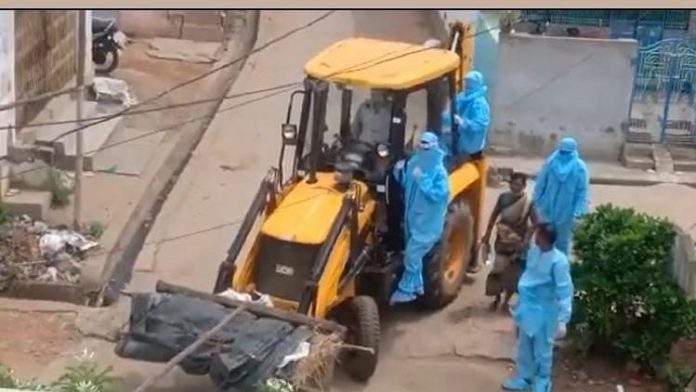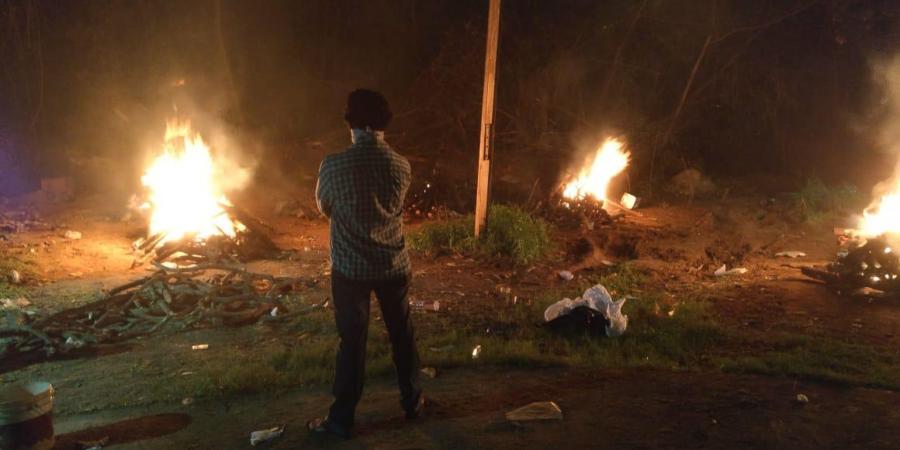
The number of deaths caused due to coronavirus is constantly on the rise and this has extended unprecedented burdens on an already fragile health infrastructure in the country. The over-burdening of the health system has meant inadequate medical care for individual patients and indignity in death for those who succumb and aren’t able to survive the infection. One of the biggest challenges being faced by the state authorities at this moment is a severe crunch of facilities to dispose the dead.
The large number of bodies that are arriving at various crematoriums and burial grounds in Delhi for example have depicted a very grim picture about how those who die due to coronavirus are treated during their final journeys. It wouldn’t be wrong to say that dignity has been eluding the dead in their last journeys as they are often seen stacked up in vans and are given hurried farewells.
In Sion hospital..patients r sleeping next to dead bodies!!!
This is the extreme..what kind of administration is this!
Very very shameful!! @mybmc pic.twitter.com/NZmuiUMfSW— nitesh rane (@NiteshNRane) May 6, 2020
With the number of deaths due to coronavirus is constantly on the rise, it is indeed becoming a struggle to give the dead a dignified farewell or a funeral that they deserve. It is clear that the number of hearse vans that we have for the disposal of the dead is clearly falling short as compared to the number of dead bodies that need to be transported to crematoriums and burial grounds.
Dead Bodies Stacked Up Together in Hearse Vans
Perhaps this is the reason why hearse vans that ferry the dead from the hospitals to the burial/cremation grounds have to often stack dead bodies one on top of the other inside the vans and bodies are often also kept on the floor of the van, according to some media reports that have emerged in the public domain in the recent weeks.
Even though the situation seems to have been a little bit eased now, as new crematoriums are added to the list, the burden of dead bodies that need to be disposed is still a heavy burden on the shoulders of government hospitals in the city.
Another problem that seems to have been dealt with to some extent as new crematoriums are allowed to dispose of the bodies of coronavirus patients and this has to do with the timings of operation.
Prior to the Delhi government’s orders relating to the extension of timings of crematoriums, many bodies were being sent back to the morgues because the crematoriums were unable to manage the load. But bodies need to be sent in bulk to crematoriums at times, in the absence of viable alternatives.
Long Waiting Hours at Crematoriums

The other problem that the kin of the dead are facing is associated with extremely long waiting hours at the crematoriums and burial grounds because of the excessive load that has come on them. Let us take the example of Delhi’s Nigambodh Ghat for example, here there has been a steady rise in the number of bodies of COVID-19 patients.
The growing backlog of dead bodies has indeed emerged as a big concern for the authorities and even the Supreme Court took Suo Moto cognisance of the media reports regarding this backlog of dead bodies of COVID-19 patients.
The Delhi government recently informed the high court that it had allowed crematoriums run by the city’s civic bodies to use wood long with electric and CNG furnaces, for cremation of death and suspect coronavirus patients.
The Delhi government has also renewed its arrangements for the disposal of the dead and now allowed two more cremation grounds- Punjabi Bagh and Panchkuian besides the Nigambodh Ghat to burn and cremate conformed and suspected coronavirus patients.
The operation hours of these crematoriums have also been extended from the earlier 9 am to 4pm to 7am to 10pm.
The Delhi government has also gone ahead and asked the hospitals to ensure that the cremations of COVID-19 patients are schedule within 12 hours of the patient’s death.
In case the family of the deceased do not contact the authorities within this period, officials are required to send an intimation regarding the last rites along with the information on time and place of the burial/cremation. But in case the body is not claimed or identified, it is mandatory for the Delhi Police to ensure that the last rites are conducted maximum within four days of death.
With shortage of workforce and the burden on hospitals growing every day, the case load is so high that they are finding it extremely difficult to manage in the given infrastructure. Given these and many constraints, the Delhi government has been trying to make efforts that things are streamlined and made less complex.
Amidst all this, the families of the deceased say that dead friends and family members are not being given dignity in death and that this hurried farewell goes against their wishes.
With the case load growing on hospitals and cremation grounds, a severe shortage of staff and infrastructure and the number of deaths constantly on the rise, it is hoped that in the coming weeks, people who die due to coronavirus are assured a more dignified farewell. After all , dignity in death is the least a human deserves.













